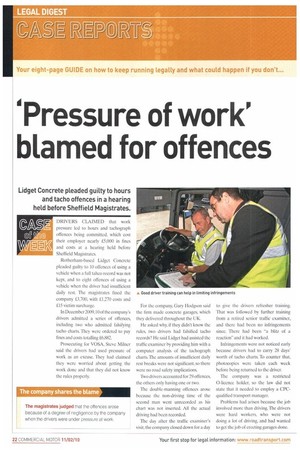Pressure of work' blamed for offences
Page 22

If you've noticed an error in this article please click here to report it so we can fix it.
Lidget Concrete pleaded guilty to hours and tacho offences in a hearing held before Sheffield Magistrates.
DRIVERS CLAIMED that work pressure led to hours and tachograph offences being committed, which cost their employer nearly /5,000 in fines and costs at a hearing held before Sheffield Magistrates.
Rotherham-based Lidget Concrete pleaded guilty to 10 offences of using a vehicle when a full tahco record was not kept, and to eight offences of using a vehicle when the driver had insufficient daily rest. The magistrates fined the company £3,700, with £1270 costs and /15 victim surcharge.
In December 2009, l 0 of the company's drivers admitted a series of offences, including two who admitted falsifying tacho charts. They were ordered to pay fines and costs totalling /6,882.
Prosecuting for VOSA. Steve Milner said the drivers had used pressure of work as an excuse. They had claimed they were worried about getting the work done and that they did not know the rules properly.
For the company, Gary Hodgson said the firm made concrete garages, which they delivered throughout the -UK.
He asked why, if they didn't know the rules, two drivers had falsified tacho records? He said Lidget had assisted the traffic examiner by providing him with a computer analysis of the tachograph charts. The amounts of insufficient daily rest breaks were not significant, so there were no road safety implications Two drivers accounted for 29 offences, the others only having one or two.
The double-manning offences arose because the non-driving time of the second man went unrecorded as his chart was not inserted. All the actual driving had been recorded.
The day after the traffic examiner's visit, the company closed down for a day
to give the drivers refresher training. That was followed by further training from a retired senior traffic examiner, and there had been no infringements since. There had been -a blitz of a reaction" and it had worked.
Infringements were not noticed early because drivers had to carry 28 days' worth of tacho charts. To counter that, photocopies were taken each week before being returned to the driver.
The company was a restricted 0-licence holder, so the law did not state that it needed to employ a CPCqualified transport manager.
Problems had arisen because the job involved more than driving. The drivers were hard workers, who were not doing a lot of driving, and had wanted to get the job of erecting garages done.




































































































































